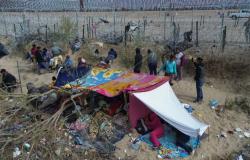
This Tuesday, the plenary session of the European Parliament gave its final approval to a new regulation that will allow the European Union (EU) prohibit the sale, import and export of goods manufactured through forced labor.
With this legislation, approved by 555 votes in favor, 6 against and 45 abstentions, the EU wants to ensure that these products have no place in the single market, whether manufactured in Europe or abroad.
The text must now receive final formal approval from the EU Council and will then be published in the Official Journal, so that EU countries will have to start applying it within three years.
The authorities of the Member States and the European Commission They will be able to investigate suspicious merchandise, supply chains and manufacturers.
If a product is deemed to have been manufactured using forced labour, it will no longer be possible to sell it on the EU market (including online) and shipments will be intercepted at the Union’s borders.
The EU against forced labor
The final decision to ban, withdraw and dispose of a product made with forced labor will be taken by the authority that conducted the investigation and the one taken by a national authority will be applied in all other Member States based on the principle of mutual recognition.
Manufacturers of banned products will have to remove them from the EU single market and donate, recycle or destroy them, according to the text.
Companies that do not comply with the regulations can be fined, while products can return to the EU single market once the company eliminates forced labor from its supply chains.
Decisions to investigate will be based on objective and verifiable information that may be received, for example from international organizations, cooperating authorities and complainants.
The Commission will have to develop a list of specific economic sectors in specific geographic areas where state-imposed forced labor exists, which will become a criterion to evaluate the need to open an investigation.
The Community Executive may also identify products or groups of products for which importers and exporters will have to submit additional details to EU customs, such as information on the manufacturer and its suppliers.
Additionally, a new single portal on forced labor will be created to help enforce the new rules.
That platform will include guidelines, information on bans, a database of risk areas and sectors, as well as publicly available evidence and a whistleblowing portal.
The rules also provide for cooperation with third countries, for example in the context of existing dialogues or the implementation of trade agreements.
The Commission could also carry out checks and inspections in third countries, if the relevant company and the government of the third country agree.
The Foundation for Environmental Justice, which ensures that forced labor affects 27.6 million people around the world, He asked in a statement that this legislation not remain mere rhetoric and that it “be properly applied and executed to ensure that it will have real consequences for those who exploit our fellow citizens for profit.”





